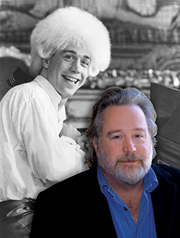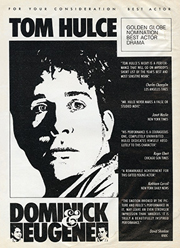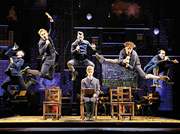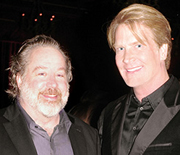
“I’ve been here for a day…. It seems interestingly eclectic here in a way that’s surprising in terms of the cliché of a big city in Texas.” Tom Hulce, Academy Award-nominated actor (for Amadeus 1984), Tony Award-nominated actor (for A Few Good Men 1990), Emmy Award-winning actor (for The Heidi Chronicles 1996), and now Tony Award-winning producer (for Spring Awakening 2007), relaxes at Houston’s Hotel Icon as he animatedly talks about his career, his coming out, and the touring production of Spring Awakening that opens in Houston January 6, 2009.
Blase DiStefano: Can we get started with Proposition 8? I think it’s interesting because as I’m interviewing you, some Houstonians are protesting at City Hall, which is not far from here.
Tom Hulce: I live in New York and I grew up in the Midwest and I have lived in California. So election night was a thrilling event in terms of possibility of the open end of the bracket, if you will, and potential for a different set of givens was quite bittersweet in terms of composition…. Perhaps we are just on a trajectory and we will prevail as soon as enough people are younger, because it seems to be not an issue in any way for people under 30.
Young people don’t seem to think anything of it, and a lot of them are experimenting. Did you ever experiment?
I grew up in Ann Arbor, Michigan, which was a very progressive community, and there was a period where it was cool to be experimenting, because it was something your parents definitely wouldn’t want you to be doing. [Both laugh] And that was a lovely coincidence for those of us who identified in the culture of the revolutionary position.

How did you feel or did you have support… I’m not trying to make assumptions here, but I read on the web that you’re out.
It’s interesting when people want to talk or not talk about that. I have no issues about that, so I’m fine to talk about it.
I guess because in a much bigger sense than any one piece of who I was, I was very dedicated to not doing things the way you’re supposed to. I was very dedicated to not following the rules, to creating my own set of rules and found that when I tried to play by the conventional rules, I was not good at it, and when I made up my own rules, I was very happy with how things went. That manifested in all kinds of ways, including in my acting career. I never made the choices that everyone thought I should make. For me, in a way, being in the film Animal House, that was my aberration [both laugh], the thing that was the most mainstream. It was like what the hell was I doing over here when six months earlier I was playing the stable boy in Peter Shaffer’s play Equus? You couldn’t find a more complex, psychotic, spiritually confused, sexually confused story, and then I go over here and become a kind of white-bread innocent icon.
Animal House was how people got to know you.
Exactly. I did a couple of other films right in that time period, but I felt it was wrong to keep pretending to be younger than I was and to keep losing my virginity, and it wasn’t interesting to me. [I was interested in] character work, because in some way the more comfortable thing for me was to do something off-center in some way.
So I took myself out of the film arena and stayed in the theater, which was completely satisfying to me. It was where I felt like I lived. I just thought that I would wait until a piece of work came along that wouldn’t seem a contradictory piece of work. And literally the next thing that came along, four or five years later, to my good fortune, was Amadeus.
We knew you, but now it was like “Oh my goodness!” From Animal House to…
Right, like, “What’s wrong with this picture!?” [Both laugh]
How did that affect you?
It was gigantic in terms of the kind of response that we got. To this day, it gives me a kind of validity and access in a way that that legacy continues. Thank God for DVDs and Netflix and everything, because it just means that everything has a very long shelf life. We were nominated for Oscars, and [F. Murray Abraham] got the Oscar ’cause we were in the same category. The Italians—interestingly, given the part he played was Italian—the Italians gave the award to me. It was so ironic and funny and fun.
The other thing I’ll tell you that I don’t think I’ve talked about was that by then I felt it was important to talk about my private life, but I had waited long enough into my public career that I wanted to wait until a moment that it would have as much bang for the buck. So I had targeted the Oscars as just the place to simply acknowledge the relationship I was in, and damnit if that didn’t work out. [Both laugh] Then as my desire to act waned, I stopped taking on the major assignments that I had had. I didn’t want this to be the consolation thing of “When you stop acting, you start talking.” [Both laugh] Then I just found a way to just not have it be an issue, but I really wanted to see if I could help.
In the meantime, I had a major chunk of time for myself both here and in London where I was doing Larry Kramer’s play Normal Heart, and that was wildly meaningful to me…. Larry Kramer and I went to the world AIDS conference in Toronto at that time and we had a press conference, and at the press conference he was talking about what it meant to him to have a gay actor to play the part. And I was like, “Oh, okay.” [Both laugh] But interestingly, the press became unable to deal with it as a piece of information, and there wasn’t a reason to make an event out of it, so they didn’t write about it. So there was a chunk of time where I was speaking openly about my own life wherever I was if it was appropriate, and there’s a kind of reverse thing that could also happen, because I wasn’t in the limelight enough for it to be some kind of titillation.
When you did A Normal Heart, were you aware of the AIDS epidemic?
Here’s what shocked me: I lived in New York at the time Larry’s play opened down at the Public Theater, I think maybe in 1985, and it was that far into the epidemic, and I lived within 20 blocks of the Public Theater, and I was so shocked. That play taught me what was going on, because I wasn’t around in the center of that life.
That must have been enlightening.
It was horrifying and enlightening, and it made me want to make my contribution at that time. I felt the best contribution I could make was through my work, and so literally I sought out the opportunity to do that piece of work.
The one in London.
Yeah. they had done that play at the Royal Court with Martin Sheen playing Larry. But in what world do I replace Martin Sheen in anything? [Both laugh]
At that time in London the epidemic was at a much earlier stage, so it felt like the play could have an effect that was much more immediate. It was bizarre—that was at the height of my popularity, because it was 18 months after Amadeus. So the front rows had teenage girls who had come to see The Normal Heart because of that, and then there were the normal theater-going audience, and there was the gay audience. It felt so cool that there was a reason for the various groups to go, and they were all having the same intense experience together.
Tell me about the making of Dominick and Eugene.
The producers set up a phenomenal circumstance where Ray Liotta and I moved to Pittsburgh and lived there for about six weeks before the filming started. There was a great care of the process in making something that gave us the best chance to do work that was as particular and intimate as it was.
I couldn’t have given my performance if Ray weren’t the other actor, because it required somebody who would be comfortable with a ridiculously intimate relationship, not sexual but intimate. To be honest with you, I don’t remember what the circumstances were, but there’s that little scene where the two brothers are in the shower, and some of the producers were getting a little nervous and suggesting we don’t shoot that. We did shoot it, even though when we were shooting it—we’re not naked—the water’s freezing cold inside! [Both laugh]
When they were casting it, I was at that point where they weren’t allowed to ask me to audition because I was too fancy at that point, so then my job became to make them understand they should choose me, without doing the thing I do best, which is act, right? So I’m showing up for my meeting with them and I just happen to have dog hair on my sweater, and they can wonder if I’m doing it on purpose or maybe it’s just me and maybe my socks didn’t match. They wanted to meet with another actor and I didn’t know who it was. I walk in and it’s Ray Liotta, and I thought, “Okay, it’s these two working-class Italian brothers, and I’m the one who’s not coming back into this room. There’s no way he and I could be twins.” [Both laugh] But bless them again for their imagination, and they understood that that could happen.
Now back to stage with A Few Good Men. It’s kinda weird…
That’s crazy, right? [Both laugh] That’s so not my territory. Before A Few Good Men was going to be done as a play, I had sent Aaron Sorkin’s screenplay of A Few Good Men to my agents saying this guy is amazingly talented, that this would be a perfect film for your clients Tom Cruise or Val Kilmer, who had just done Top Gun. So in order to help Aaron, I had already cast the film. [Both laugh] Many years later, I get a phone call asking if I would like to be in it, and I’m like, “That’s crazy. What are they thinking?” I was thinking this is the only time in my life I’ve been asked to do this kind of a part. And so I agreed to join them.
What was the filming like on Murder in Mississippi?
We were shooting right outside of Atlanta, and Blair Underwood and I were rehearsing a scene on the street and people didn’t know we were acting, and someone pulled over to me and said, “You better get out of here, there’s going to be [trouble].” I’m like, “Dude, we’re rehearsing.”
That would be scary. How did that shoot go?
That was an amazing story to climb into. When you shoot a film for television, the shooting is fast. But it was something where everybody was committed to it. But if you’re looking to cast someone who is identifiably Jewish and from New York City, the fact they got the WASP from Detroit to do it… [Both laugh] It just meant that I got a lot of opportunities to climb into some really interesting stories along the way.
Were there other incidents during the filming?
There was a scene with a lot of extras, and some people brought their own KKK outfits—that was a little tense.
How scary. Makes me sit up. You’ve really done a lot of different roles and…
Lucky me, right? This applies to Spring Awakening—the fact that in some way I had the luxury of pursuing the work that intrigued me or challenged me and never really had to have a consideration about my career or commercial concerns. Part of what I think has allowed Spring Awakening to become what it’s become is the fact that we never talked about where it was going to end up.
It got started about nine years ago, right?
Yes, the authors and Michael Mayer, the director, worked for about two years through a number of workshop processes just writing it. And then it got put aside both because 9/11 happened and the theater in New York that was going to do it for a while became much more conservative in what they were doing. And then the director and I went and made the film The Home at the End of the World. So basically I made their director unavailable to them for a couple of years. [Both laugh]
We invited Duncan [Sheik] to do the score, and Duncan and Steven [Sater] did two songs for the film. But basically they chose to wait and not get a different director, so then the month the film opened, I sat down with the three of them and said that I would love to re-invigorate the adventure of Spring Awakening and help take it to wherever it wanted to go and to finish the process. Probably about six months later we did a concert reading at Lincoln Center, and then about 10 months after that we started the process at the Atlantic Theater. I started it about five years ago, and for me it was full time because it was the hardest thing to get people to understand what we saw that you couldn’t see when you read it on the page.
So you had to verbally convince them…
And get them into a room with it and let them understand the thrill of being in a room with a dozen young people in their late teens and early 20s and this material and the kind of authenticity that both the material and these performers can bring to it. The play is based on the 1891 Frank Wedekind play, which is kind of a classic.
Wasn’t it banned for 100 years or so?
Yeah. The first uncensored English language version was done in the ’70s. But to understand, there is this story that is honest, a cautionary tale about what happens if we are unable to answer the needs of our young people. But hand in hand with that, to have an exhilarating, quite beautiful musical, this piece is so contradictory in every way. This story takes place in the 1890s, but the songs are in a contemporary idiom; the story takes place in a kind of repressive, conservative provincial community, and the songs take place in an abstract place that is full of great exhilaration and possibility and color. The songs are considered some kind of rock, but in their description in the press, they use words like “ravishing” and “gorgeous.” Those two words don’t go together, so there’s something about it—there’s a new set of rules that have made it incredibly challenging but also incredibly satisfying when it turns out the work that we did can be accessible to so many different groups of people.

And at the Tonys, you won…
When we did the concert at Lincoln Center, after that concert my partner Ira [Pittleman] joined us, and he and I are now producing partners in terms of new projects.
You were the two producers?
To begin with, I was the only person in the room moving it forward, and then Ira joined, and then the Atlantic Theater Company offered us a home, so we were able to do the production at the Atlantic. At that point just Ira and I were involved and then we decided we would be crazy and move the show to Broadway, something we thought was a crazy idea even though it was greatly acclaimed in the 168-seat theater. [Both laugh] The fancy people started to show up, and on one night two people from the cast of Grey’s Anatomy, Steven Sondheim, and Keanu Reeves were in the audience, and the next night it was James Franco and Calvin Klein and David Bowie. That was happening before we moved, so clearly there was a buzz about it that was spreading fast. Then we moved uptown and took on two other partners, and then each set of partners were responsible for raising half of the money, so Ira and I raised about half and the others were brought in under the leadership of our partners.
My head is spinning.
Right. Have you ever seen so many people?
At the Tonys, who goes up to accept the award?
Ira and I spoke in acceptance but everyone—however many there are listed—everyone came up on stage, the cast came up on stage, it was a very full stage even at Radio City.
Ira is your business partner?
Yes.
Do you have a…
Right now? I’ll be changing this right fast, but the experience, the work experience of this has been so overwhelming that I’m not in a relationship. But my life in general, I work a 12-hour day, and the success of Spring Awakening and its proliferation worldwide is turning out to be quite amazing.
It’s coming here to Houston and then it’s going where?
It’s touring North America, is now booking in 2010, and has an invitation to go to China, this company in English.
China!?
China. Go figure. We open in London for the British production in February [2009], we open in Vienna for the production for all the German territories at the beginning of April, the Korean production opens July 4, and the Japanese production has been in the works, but they haven’t figured out when they’re going to launch, so it’s a phenomenal thing. And interestingly, I think because it’s not literally American in terms of the subject matter, that it has a kind of attraction worldwide.
Is it that accessible in these places?
In a way, it has the form of a classic story.

The other countries aren’t as puritanical?
I think America is the most puritanical of all countries. I think we don’t think of ourselves that way, but we’re so young. They have centuries and centuries of history they’ve lived through, and scandals they’ve been through. What they’re responding to is the center of it, which is the quest of these young people to find their way into a better world or to create one. And the challenge to us as adults: How the hell do you bring a young person into
the world and do it responsibly and empower them or choose not to so they can have the best life? So all that transcends culture, and the story goes into a great array of things we might have experienced in our adolescence. There are so many different points of identification that in the aggregate become quite universally accessible.
How has the response been?
When we were in San Diego, I saw it with the oldest audience I’ve ever seen it with, and they were quiet but nobody walked out, and at the end they gave it such an ovation. The circumstances of the story being as restrictive as they are in that little town in the 1890s, it actually felt for that audience a relationship as they were growing up, so they climb in in a way that’s almost more literal than our young audience, which climbs in more because of the issues of it and what it’s exploring.
And there’s a subplot in it of one boy who may find that he likes boys, and there’s a scary capitalist character who basically has a theory about life that there’s a way to play it, and you can play it so you get what you want. And basically what he wants is whatever he wants. So there’s a mirror relationship to the central love story that’s between two boys, but it’s not conventional in any way because the aggressor in the relationship, who knows what he is except that he’s definitely somebody who’s going to beat the system.
What are the characters’ names?
Hanschen and Ernst. In a conventional story, that story would be lovely and unexpectedly sweet, but in ours it turns askew in a way that is unique. Our theory is that the character who is seducing the other one—his children and grandchildren will end up being Nazis. The German legacy of it all.
Spring Awakening plays January 6–18 at the Hobby Center. Tickets start at $26 and are available at the Hobby Center box office (800 Bagby), all Ticketmaster outlets (713/629-3700), or online at www.BroadwayAcrossAmerica.com.
Blase DiStefano interviewed Chad Allen for the September 2008 of OutSmart magazine.
CAPTION for first photo:
The music man: Tom Hulce was about 30 years old when he played Mozart in the 1984 film Amadeus, which earned him an Academy Award nomination. Now 55 [in 2009], Hulce is a producer of Spring Awakening, the Tony Award-winner for Best Musical in 2007. Broadway Across America brings the play to Houston’s Hobby Center, January 6–18, 2009. Details: www.broadwayacrossamerica.com.











Comments